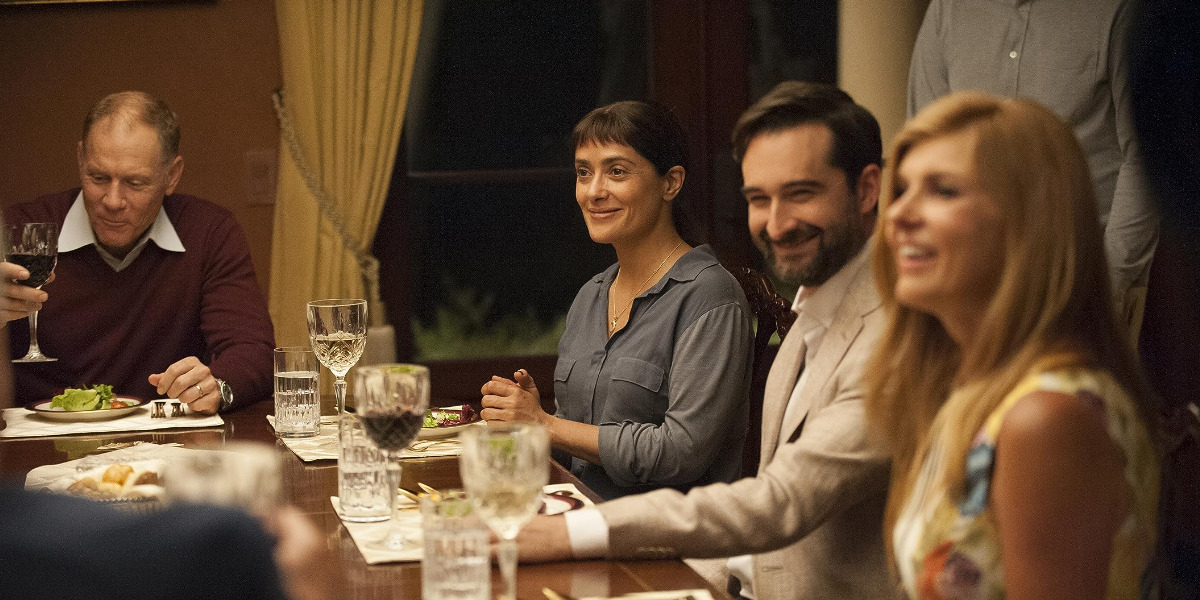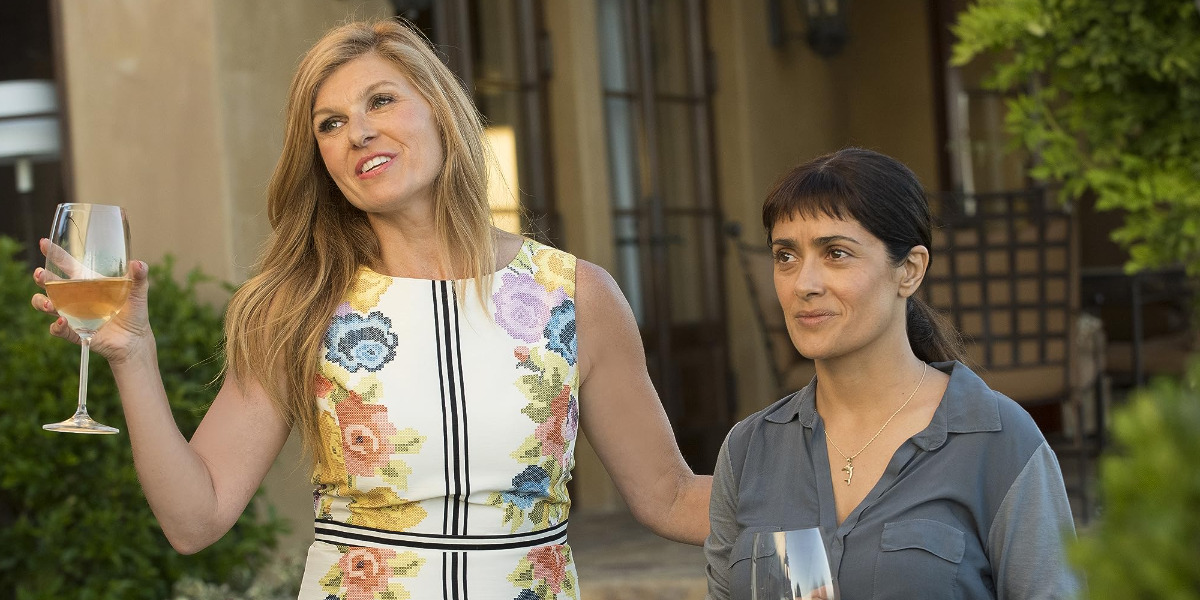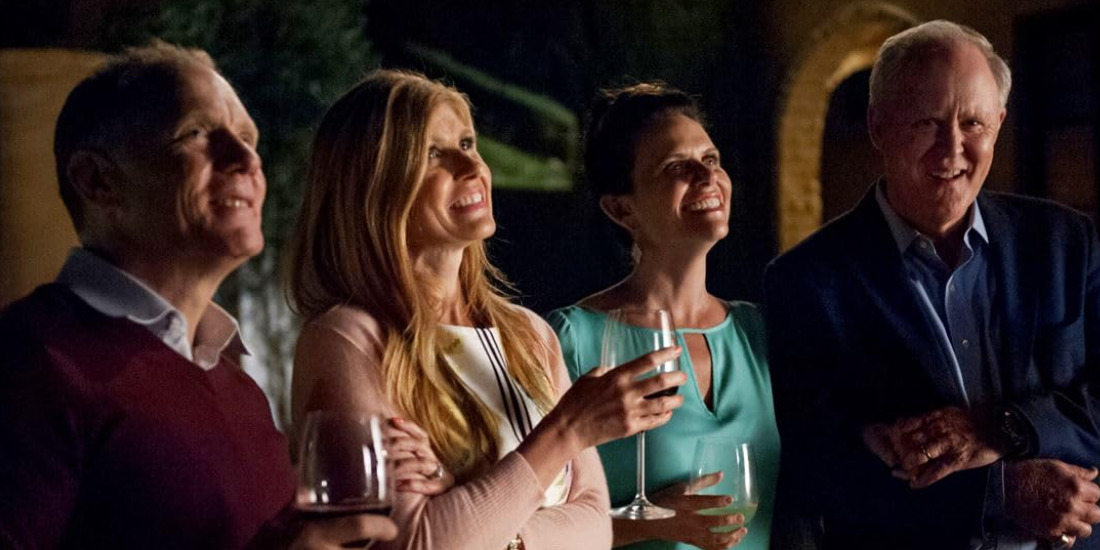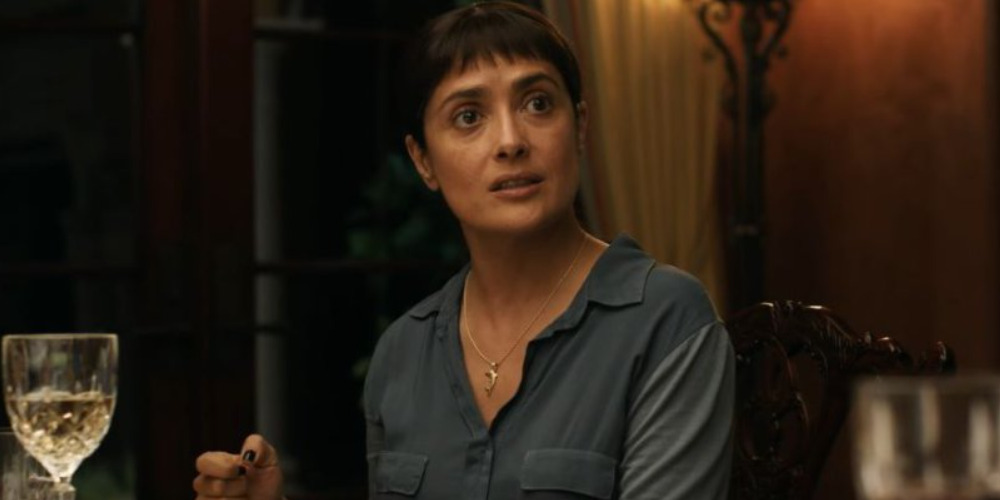Directed by Miguel Arteta, 2017’s ‘Beatriz at Dinner’ is a drama film that partakes in the significant cultural conversation about society’s class divide. With Salma Hayek as the titular character, the film follows Beatriz, a deeply empathetic health therapist from Mexico who’s firm in her holistic beliefs that the world is always interconnected. After her car breaks down at a wealthy client, Kathy’s house, the woman invites Beatriz to stay for dinner, wanting the latter to feel like a close family friend. However, once Kathy’s guests arrive, Beatriz soon realizes that this is the last place befit for her after she finds herself stepping into an unwitting battle with Doug Strutt, the real estate mogul who embodies everything Beatriz is against.
The film follows a dinner between a group of people, with Beatriz and Doug’s clashing worldviews at the center. Although the storyline remains pretty straightforward for a while, the narrative equips a more metaphorical lens toward the film’s end. As such, the film’s ending may have left some puzzled. If so, here is everything you need to know about the ending of ‘Beatriz at Dinner.’ SPOILERS AHEAD!
Beatriz at Dinner Plot Synopsis
Beatriz Luna is a hardworking health therapist who works at the Arendale Cancer Center and offers alternative medical solutions to patients, such as massage, aroma therapy, Reiki, and the like. One day after her shift at Arendale, Beatriz drives through rush hour traffic to the Birkhofers mansion for her massage appointment with long-time customer Kathy Birkhofers. The latter is hours away from a dinner party and desperately needs a massage before facing her husband’s big work dinner.

However, when Beatriz tries to leave after the appointment, she realizes her car has broken down. Worse yet, it would take her mechanic friend long hours before he could drive to the neighborhood to help Beatriz out. As a result, Kathy, forever grateful for Beatriz’s role in her daughter Tara’s post-cancer recovery, convinces her husband Grant to let her invite Beatriz to the dinner.
As the night’s guests begin to trickle in, Beatriz’s out-of-place presence begins to become visible. Alex and Shannon are a young couple, enthusiastic to make their mark on the corporate world. Meanwhile, Doug Strutt, who arrives at the party with his third wife, Jeana, is already an industry legend and used to people sucking up to him. Initially, Beatriz tries to mingle with the guests, putting up with their sickening gossip and Doug’s passive racism. Nevertheless, things go downhill once Doug starts discussing his latest venture of acquiring a controversial legislature with Alex and Grant and facing down protesting activists.
Doug’s demeanor constantly reminds Beatriz of something from her past, but she can never put a finger on it. Eventually, Doug’s hunting hobby takes conversational center stage as he drones about the beauty behind killing animals. Consequently, he shares pictures of his last adventure in Africa, where he killed a rhinoceros in the wild. Once the picture makes it to Beatriz, the woman is horrified at Doug’s cruelty.
Unable to hold in her anger due to the recent brutal loss of her beloved goat, Jeronimo, and her slightly drunken state, Beatriz loses her cool and throws Doug’s phone at him while calling him disgusting. Afterward, she apologizes to Kathy for her outburst, and although the woman is sympathetic, she urges Beatriz to tune in for the night in Tara’s room. The respite away from the group only affords Beatriz some time to search Doug Strutt on the internet and learn about his various heinous business practices, like exploiting his workers and routinely harming the environment while solely caring about chasing profits.
The same compels Beatriz to return to the party, where she fails— or refuses to read the room. Joining the group again, Beatriz sings them a song as she previously promised Kathy. After singing ‘Las Simples Cosas,’ a Spanish song about yearning to return to a past that no longer exists, Beatriz attacks Doug’s way of life. An argument between the two breaks out, with Doug employing a hedonistic philosophy, uncaring about his harmful influence over the world around him. Ultimately, Grant pulls Beatriz away from the party and calls a tow truck for her to leave once Beatriz’s jabs at Doug become too much for the Birkhofers to tolerate.
Beatriz at Dinner Ending: Does Beatriz Kill Doug?
The thick tension between Beatriz and Doug makes up the narrative’s central conflict. Early in their interactions, Doug establishes a flippant and glaringly racist perception of Beatriz, while Beatriz equips an inherent distrust of the man. When Beatriz was young, her hometown, Tlaltecuhtli, saw grave damage after an American hotel conglomerate opened an establishment in the area. The hotel illegally seized the land and forced the citizens out of their homes. As such, when Beatriz learns about the backlash against Doug’s land acquisition, she wonders if Doug has a connection to the incident.

Nonetheless, the idea soon disproves itself after Doug, who can’t even pronounce Tlaltecuhtli despite repeated guidance, confirms he has never opened a hotel in that part of the country. Still, the same is little consolation after Beatriz discovers the numerous unjust crimes the man committed over his career. Doug has built his wealth on the backs of his workers and chooses to rob them of their wages. Doug’s “business” has amassed a great overall negative impact through unlawful methods.
Furthermore, Doug takes pleasure in the same. Like hunting, he enjoys the thrill of his business and is negligent of the countless people he tramples on his way to the top. His character acts as a stark contrast to Beatriz, who feels a connection to all life around her. Toward the end, Beatriz realizes the party, full of the uncompassionate wealthy, is no place for her, and she waits by the front door for the tow truck to arrive.
During the same, Doug wanders to Beatriz after taking a business call and goes out of his way to approach her and share his unwarranted wisdom. Doug talks of life’s fatalism and tries to excuse his actions by claiming that since death is imminent, he might as well have fun while he can. His philosophy about life’s meaninglessness due to its inevitable end hammers the final nail in the coffin for Beatriz.
As a result, just as Beatriz is about to leave in the tow truck, she returns to the house, arming herself with a letter opener, and stabs Doug in the neck. Nonetheless, the murder is only a momentary fantasy. Throughout the film, Beatriz embodies an immensely peaceful woman who can’t even hurt animals in the name of sustenance. Therefore, her sheer urge to slay Doug showcases how the man drives Beatriz to the literal edge.
Nevertheless, Beatriz doesn’t actually kill Doug. Instead, she returns to her senses at the last moment and drops the letter opener, wordlessly exiting the house. In the end, Beatriz chooses to stay true to herself in the face of Doug’s atrocities. Yer, her encounter with Doug changes something intrinsic inside of her.
What Happens to Beatriz?
After Beatriz leaves Kathy’s house, the former remains shaken by the experience. Beatriz is visibly uncomfortable throughout the dinner, acutely aware of the vile behavior of the people around her. She witnesses an entirely new side of Kathy as she maliciously tears down a teenage actress for the leak of her private images. Likewise, she watches as Doug and the others showcase how their wealth has disconnected them from reality.

Furthermore, the group constantly overlooks Beatriz by talking over her and rarely noticing her presence save for when she says something they don’t like. The entire evening shows her an ugly side of humanity and even brings out the worst in her, considering her uncharacteristically violent fantasy. As such, on her way home, Beatriz makes the tow truck driver pull over in the middle of the road and climbs down the side to reach the beach.
Beatriz walks into the ocean and immerses herself in the water, swimming toward the horizon. Shortly after, the scene fades out, and we see a young woman paddling her boat through a river surrounded by a mangrove. Although the film’s ending is ominous and perplexing, this conclusion to Beatriz’s narrative seems to be in the making throughout the story.
At times, Beatriz reaches out to an old childhood companion, Naroli, and sends multiple voicemails to her. In one such voicemail, Beatriz expresses her wish to return to a time when she was with Naroli, carefree in their Mangrove, at peace in their home. Similarly, when the time comes, Beatriz chooses to sing a song about one’s inability to return to a nostalgically safe past.
Therefore, the film’s climax represents Beatriz trying to “swim back” to a time when things were simpler. Beatriz yearns to return to her past when the world seemed happier and brighter, free of people like Doug. Although the same paints an idealistic picture, the truth behind the metaphor is much darker. In the end, Beatriz becomes so exhausted from the world that she commits suicide by walking into the ocean. The film intentionally concludes with an open ending, allowing the audience to interpret Beatriz’s story however they wish. Nevertheless, an interpretation where Beatriz finds a happy ending is severely out of the viewers’ grasp.
Did Doug Kill Beatriz’s Goat?
Early in the movie, when Beatriz gives Kathy a massage before the dinner, the therapist discusses her goat, Jeronimo’s death. Beatriz intensely cares for other lifeforms, being a holistic person, and has several pets, including dogs and two goats, Jeronimo and Hercules. Although the goats greatly enrich her life and have been with her for years, their presence in the neighborhood annoys another resident. Given their nature, the goats bleat often and make some noise.

Beatriz does her best to keep a hold of the situation and keeps her goats inside her home for the most part. Still, she lets them outside in her garden every once in a while so they can play. Consequently, after one such instance, Beatriz finds Jeronimo dead by her front door with his neck snapped. Jeronimo likely wanders away from the garden and in the neighbor’s path. Thus, the latter kills the animal in cold blood, leaving his body as a warning to Beatriz.
Since goats aren’t allowed in the neighborhood, Beatriz is powerless to act against the neighbor and carries the grief of losing Jeronimo with her. After leaving the dinner in the tow truck, Beatriz has an epiphany about how Doug killed Jeronimo before she inevitably flees to her ultimate demise. However, Beatriz’s claim about Doug killing her goat is purely a metaphor rather than an account of the event.
Given the film’s intense focus on class disparity, the idea that Doug could be Beatriz’s neighbor is unmistakably inaccurate. When Beatriz talks about Doug killing Jeronimo, she isn’t referring to Doug as an individual. Instead, Doug is a stand-in for the wealth-hungry people who occupy the antagonistic space within the narrative.
The insatiable greed within the world acts as the prominent foil in Beatriz’s story. In her youth, a greedy hotel owner stole her rightful land and drove her from her country. She is constantly belittled and ignored in society because of her status and has to prove her worth. Doug, a criminal offender himself, gets to escape consequences for his crime because of his wealth, whereas Beatriz has to justify her legal right to be in the country because of her race.
The neighbor who killed Beatriz’s goat presents another facet of society that people like Doug control, with Beatriz at the bottom. As such, Beatriz accuses all the Dougs of the world of Jeronimo’s death since they are the source of countless suffering. Beatriz’s accusation of Doug killing her goat is not literal but metaphorical.
Read More: Best Salma Hayek Movies You Must See


You must be logged in to post a comment.